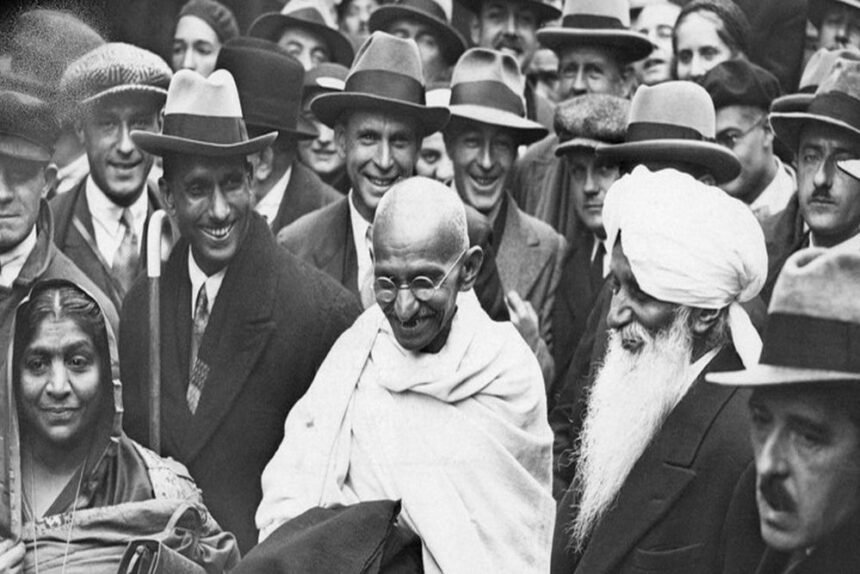Introduction: Mahatma Gandhi, also known as Mohandas Karamchand Gandhi, is a towering figure in the history of India and the global struggle for freedom and justice. He is often referred to as the “Father of the Indian Nation” due to his pivotal role in India’s fight for independence from British colonial rule. Gandhi’s life and teachings have left an indelible mark on the world, inspiring countless individuals and movements for civil rights, nonviolence, and social justice.

Mahatma Gandhi Essay
Early Life and Education: Mahatma Gandhi was born on October 2, 1869, in Porbandar, a coastal town in the western Indian state of Gujarat. He came from a devout Hindu family and was deeply influenced by the ethical and spiritual values of his parents. His early education in Porbandar and later in Rajkot laid the foundation for his quest for truth and justice.
Journey to becoming a Leader: Gandhi’s journey to becoming a leader of the Indian independence movement was marked by various experiences, including studying law in London and working as a lawyer in South Africa. It was in South Africa that he first employed the strategy of nonviolent resistance, or Satyagraha, in fighting against racial discrimination. This experience shaped his commitment to the principles of nonviolence and civil disobedience.

Mahatma Gandhi Essay
The Role in India’s Freedom Struggle: Upon his return to India in 1915, Gandhi joined the struggle for India’s independence from British colonial rule. He quickly became the leader of the Indian National Congress and launched numerous campaigns, including the famous Salt March in 1930, to challenge the unjust British laws and policies. His philosophy of nonviolent resistance gained widespread popularity and inspired millions of Indians to join the struggle for freedom.
Principles of Satyagraha: Gandhi’s philosophy of Satyagraha emphasized the power of truth and nonviolence as tools for social and political change. He believed that individuals could resist oppression and injustice through passive resistance, refusing to cooperate with unjust authorities, and willingly enduring suffering if necessary. This approach not only played a pivotal role in India’s struggle for independence but also inspired movements for civil rights and social justice worldwide.
Legacy and Impact: Mahatma Gandhi’s legacy extends far beyond India’s struggle for independence. His teachings on nonviolence, truth, and social justice continue to inspire individuals and movements around the globe. Figures like Martin Luther King Jr., Nelson Mandela, and Cesar Chavez were deeply influenced by Gandhi’s principles in their own fights for civil rights and equality.

Mahatma Gandhi Essay
Gandhi’s Vision of a Just Society: One of the most remarkable aspects of Mahatma Gandhi’s leadership was his vision of a just and inclusive society. He believed that true independence could only be achieved when all sections of society, regardless of caste, creed, or socio-economic status, were treated equally and with respect. Gandhi advocated for the upliftment of the marginalized and the eradication of untouchability, working tirelessly to bridge the gaps within Indian society.
Self-Sufficiency and Simplicity: Another core element of Gandhi’s philosophy was the promotion of self-sufficiency and simplicity. He encouraged Indians to engage in cottage industries and spin their own khadi (handspun cloth) as a means of economic self-reliance and resistance to British-made goods. This emphasis on self-sufficiency aimed to reduce dependence on foreign imports and empower local communities.
Gandhi’s Lifestyle and Dedication: Gandhi’s personal life was a testament to his commitment to simplicity and truth. He dressed in simple, traditional Indian clothing, lived in ashrams, and practiced voluntary poverty. His dedication to his principles often led him to undertake hunger strikes and endure physical hardships as a means of nonviolent protest. His life was a living example of the values he preached.
The Impact of Gandhi’s Assassination: Tragically, Mahatma Gandhi’s life was cut short when he was assassinated on January 30, 1948, by a Hindu nationalist who disagreed with his policies of nonviolence and religious harmony. His death sent shockwaves throughout the world, and India mourned the loss of its beloved leader. However, his teachings continued to guide the nation and the world in the years that followed.

Mahatma Gandhi Essay
Conclusion: In conclusion, Mahatma Gandhi’s life and legacy are a testament to the enduring power of nonviolence, truth, and social justice. His unwavering commitment to these principles led India to independence and inspired countless individuals and movements globally. Gandhi’s vision of a just and inclusive society, his emphasis on self-sufficiency and simplicity, and his personal dedication to his principles serve as an enduring source of inspiration for anyone seeking positive change in the world. As we reflect on the life of this remarkable leader, we are reminded of his famous words, “The best way to find yourself is to lose yourself in the service of others.” Mahatma Gandhi’s life exemplified this ethos, and his legacy continues to inspire us all to strive for a better and more just world.
ALSO READ:The Legacy Of Mahatma Gandhi: Celebrating His 154th Birth Anniversary




































